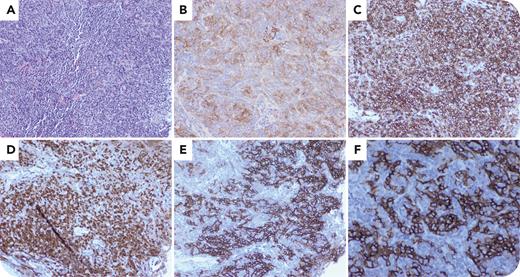A 66-year-old woman presented with a mediastinal mass and a diagnosis established elsewhere of “diffuse large B-cell lymphoma,” status post 2 cycles of R-CHOP (rituximab, cyclophosphamide, doxorubicin hydrochloride, vincristine sulfate, prednisone) therapy. She presented for a second opinion, and positron emission tomography/computed tomography showed a large and heterogeneous soft tissue mass in the right anterior mediastinum with moderate fluorodeoxyglucose uptake. Review of the previous mediastinal biopsy specimen showed thymic tissue with cohesive clusters of intermediate-size cells with fine chromatin and thin nuclear membranes mixed with small lymphocytes without cytologic atypia (panel A; hematoxylin and eosin stain, original magnification ×200). Keratin antibody highlighted epithelial cells (panel B, original magnification ×200), and CD5 and terminal deoxynucleotidyltransferase highlighted thymic T cells (panels C and D, original magnification ×200). Surprisingly, CD20 was aberrantly positive in many large clusters of cells (panel E, original magnification ×200; F, original magnification ×400). The CD20+ cells were negative for other B markers including CD19, CD79a, PAX5, and OCT2. The morphology and immunophenotype supported the diagnosis of thymoma, type AB.
This case illustrates that CD20 can be aberrantly expressed by the neoplastic epithelial cells in thymoma and may pose a diagnostic pitfall when evaluating a mediastinal mass. Neoplastic epithelial cells with aberrant expression of CD20 should not be misinterpreted as evidence of B-cell lymphoma.
For additional images, visit the ASH Image Bank, a reference and teaching tool that is continually updated with new atlas and case study images. For more information, visit https://imagebank.hematology.org.


This feature is available to Subscribers Only
Sign In or Create an Account Close Modal